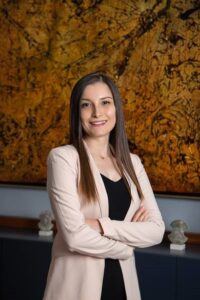
I have always had an opinion, a judgement on topics like politics, social judgement, values, social awareness and history in social and family settings. However, I was always told to show some respect and listen without interfering as I was still young, and did not have enough knowledge and experience yet. That I will not be satisfied with this understanding; I realized that I wanted to be right in the middle of what I was kept out of as soon as I understood with the desire for a full expression, the need for defence, the search for a justification that I felt at that moment. With these judgments, I decided to move forward with an understanding of justice and law, a place where you can make a statement on a subject, where you are given the right to speak, and where every word you say has an effect and result. Hence, my goal was clear during primary school, without waiting for the selection period in high school and university; my diaries always ended with the Marmara Law’s logo.
So Why Law? Law to be able to express thoughts freely, to be able to defend against injustices with a louder voice, to take an active role in order to establish the understanding of equality, rights, law and justice in the society, to be an authority applied for the defence of the rights of the individual, to ensure social peace, in order to enable people to live together in peace and in a common communication language. Although I thought that I could achieve all this desire to gain legal awareness with the judgeship, despite the high scores I got, me being eliminated from the interviews showed that I could not acquire legal awareness in a process involving different factors; attorneyship because it is a freer field where only success and merit are taken into account.
What are your experiences as a woman working in the legal sector?
One of the things I have experienced as a female attorney in the legal sector is that women’s different perspectives and characteristics have led working life in a positive direction. In fact, although it has been suggested by many researches that men has the following: leadership motivation, authority, keeping up with change, being detail and result oriented; and that women also stand out in terms of personality, team spirit, keeping the team together, inclusive evaluations rather than detailed, caring about the process rather than the result. When all of these factors are evaluated together, both a good team spirit and result targets come forward. Miran Legal, where I am shaping and practicing my experiences, is progressing with this perspective, and by working with women in many business positions, it both creates social awareness and aims to make this staff move forward with a successful vision. In this way, the fact that the law firm you work with has a clear vision ensures that your future is clearly predictable, specifiable and regulable. Thus, while choosing a law firm where you will share your knowledge, experience, labour, time and career in the field of law as a female attorney; I am of the opinion that it is important for us to follow a planned and successful path as women, paying attention to whether it provides an assurance that you can see as soon as you enter the steps of your career.
Factors increasing the status of women in the legal sector:
I believe that the factor that increases the status of women in the legal sector is again women. Yes, it started with education for women to be actively involved in legal life on an equal basis. However, this was not enough. This was already a necessity. Attorney women, who have made a difference with success and determination and have reached the level where they will not leave a word to anyone, paved the way for women to have a place in the field of law again. That is how, as women, we have been able to exist in every field in work life. In the amphitheatre, courtroom, factory, office, construction site, academy, on stage. Thus, as long as women were successful, they paved the way for another woman to be successful. Another issue that paves the way for women to be actively involved in work life in our country is; catalysed access to information. As a matter of fact, we can now see and compare what a woman attorney anywhere in the world can do and what rights she has, even from Turkey. This comparison pushes the countries to an international comparison and raises awareness, making this issue a target to be reached. The status of women in the field of law has been increased with business circles aiming to adapt this awareness to working life, such as Miran Legal, and working conditions have been created on equal terms with men and opportunities. In fact, as can be seen in Miran Legal, formations have been made on women’s employment with a clear margin in the direction of positive discrimination for women. With the support of all these perspectives and the determination of strong women, the status of women in the legal sector has also become active. Although male attorneys are still most likely to be elected to or preside over the Supreme Judicial Organs, this perception will disappear in time from the perspective of the business circles I mentioned.
How would you describe the culture at Miran Legal?
It is a culture aiming to carry out the social responsibilities in the field of law, open to all diversity, from clients to whom legal services are provided to preferred office staff, without discrimination of ethnicity, race, language, religion, open and forward-thinking, maintaining sincerity in human relations despite growing in vision and mission; observant, extroverted, active, open to development and innovation at any time, can adapt innovations quickly, does not depend on people or people, is successful, has a young energy.
What would you recommend to female students who want to get involved in the legal field based on your career and experience?
- During the legal education, they should first have all the theoretical knowledge of the law in a way to create a certain legal logic rather than memorization of the literal. Because information, legislation is constantly changing and can be easily accessed by everyone. However, where you should look in the face of a dispute, which factors you should consider do not change and occur with a good legal education. As long as this logic exists, all that remains will be to apply the legislation to the dispute.
- I recommend that they do not neglect to take Foreign Language Education in the intensity of their legal education. Because, with graduation, they would prefer to have completed the entire education process while they were students, as a rapid transition from theoretical life to practical life would be made.
- Participating in many trainings, seminars, imputed litigation studies in the field of law.
- To actively participate in social responsibility projects during their student years.
- They should not limit themselves by determining their goals before completing their legal education, and they should start to determine them after they graduate and a certain legal logic and direction of desire is formed.
- Most importantly, their knowledge, success and career processes in which they will work for; They will have to complete their career planning in law firms with a broad vision that can evaluate their career planning the best way.
What would you be, if you were not an attorney?
If I wasn’t a lawyer, I would be a journalist-writer. Transferring the facts from my own eyes, interpreting, criticizing, defending, sharing my thoughts would still be subjects that would satisfy me occupationally.
Which woman inspires you the most?
I chose the law department and Istanbul University, inspired by the life of Süreyya Ağaoğlu. She had entered as the first female law student through the gates of Istanbul University. As the only woman who wants to study law apart from men; she convinced 3 more women and opened the law school. Then thousands of women were able to enter through that door. Every time I enter through the same door as one of those women; Remembering that Süreyya Ağaoğlu paved the way for entering through this door for the first time, I always thought that I should be determined and hardworking.
How do you manage work – life balance?
Work-life balance can be achieved if the expectations from both of our statues are met in a balanced way. While a constant concentration in work life distracts you from your life, a situation in your life can also interrupt your work life. I am able to keep this balance in balance with the flexible working methods provided by Miran Legal in this regard. With many flexible opportunities such as weekend holidays, full annual leave holidays, working from home on certain days, giving motivational leaves, not making any work-related demands after the end of the working day, work and life are already separated. You can manage it in balance without having to be separated like a detached or caste system.
What is the biggest achievement you are proud of in your career?
The thing I valued most in my career was the moment when I managed to break away from a work environment where I had to support the ideologies and ideas of others, despite the steady progress of my career, and decided to start from scratch. Starting a career in which I would be free, although difficult, was a guiding development in my life.
How do you see the new generation of female attorneys?
When I compare it with my own era; I can say that I observe the new generation of women’s attorneys as having a high level of awareness, more assertive, brave, participatory, social and versatile in expressing their rights. Nevertheless, besides all these, I also see that literal, which has developed with the fact that the information is easily obtained, can replace the “research of the right information from the right places with the right perspective” and manifest as “not using the ability to research and enforce legal logic” in attorneys who have just started their new legal profession.
Miran Legal’s Diversity Agenda
The most important diversity and inclusion role of Miran Legal is to provide a working environment where everyone, including the legal unit, administrative unit, field workers, feels valued and respected. It believes in the power of diversity that everyone will create in the workplace and in the business area, and cares about everyone’s contribution to the business and develops it by planning. It is a positive law firm with diversity and inclusivity, as it has created a productive workplace culture that is always open to collaboration and to evaluate new ideas. With this perspective, loyalty and productivity increase, progress can be made as a team, and diversity can be increased according to the interests of the team.
Diversity and Inclusivity in Legal Sector
Sadly, monopoly rather than diversity and inclusiveness in the legal sector is still more dominant. Although law firms that have implemented corporate principles such as Miran legal raise awareness on this issue, due to the fact that diversity and inclusion requires a long and difficult road, the results will show in the future rather than immediately, and there is a need for a prospective investment of labor and knowledge from capital investment at the beginning; The understanding that creates a working environment based on singular success is still high. Miran Legal on the other hand has proven that it is completely far from this singular understanding of success by advancing with an understanding that shares the support of everyone working with their success.
 Tell us about your career choice and journey. What inspired you to become a lawyer?
Tell us about your career choice and journey. What inspired you to become a lawyer?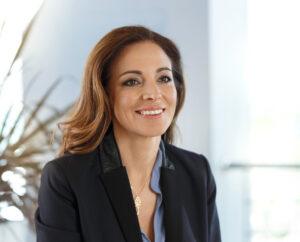 Tell us about your career choice and journey. And what made you decide to get into Intellectual Property and Trademark law?
Tell us about your career choice and journey. And what made you decide to get into Intellectual Property and Trademark law?  Tell us about your career choice and journey. What inspired you to become a lawyer?
Tell us about your career choice and journey. What inspired you to become a lawyer? 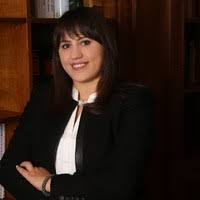
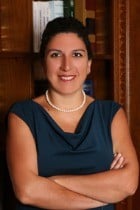 Tell us about your career choice and journey. What inspired you to become a lawyer?
Tell us about your career choice and journey. What inspired you to become a lawyer? 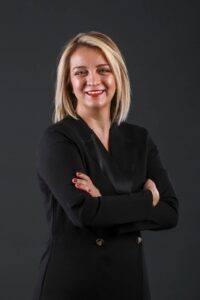 What was it that made you want to become a lawyer?
What was it that made you want to become a lawyer? What was it that made you want to become a lawyer?
What was it that made you want to become a lawyer? 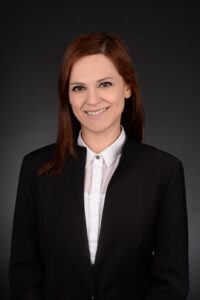 Tell us about your career choice and your journey.
Tell us about your career choice and your journey. 